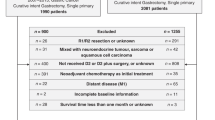Abstract
Background
Extranodal metastasis is an isolated tumor nodule without a residual lymph node structure and has been reported as a poor prognostic factor in gastric cancer. The aim of this study is to assess the prognostic value of extranodal metastasis, especially from the viewpoint of its anatomical distribution.
Methods
A total of 139 consecutive gastric cancer patients who underwent curative surgery with lymph node metastasis between 2008 and 2009 were included. Clinicopathological features and patient survival outcomes were retrospectively assessed. Patients with extranodal metastasis were subdivided into two groups: perigastric extranodal metastasis, located near the perigastric area (#1–#7 according to the Japanese classification of gastric carcinoma 15th edition), and extra-perigastric extranodal metastasis, located alongside the major vessels (#8–#12).
Results
Extranodal metastasis was found in 51 patients (37%), and it was more frequent in those with bulky, ≥pT3, and pStage III tumors. All patients with extra-perigastric extranodal metastasis had recurrence, resulting in a 0% 5-year overall survival rate, which was significantly worse than that of patients with perigastric extranodal metastasis (59%), or those without extranodal metastasis (84%; P < 0.001). Multivariable analysis identified the presence of extra-perigastric extranodal metastasis as an independent poor prognostic factor.
Conclusions
Extranodal metastasis, especially extra-perigastric extranodal metastasis, was a pivotal poor prognostic factor in node-positive gastric cancer. Recognizing extra-perigastric extranodal metastasis would help provide optimal therapeutic options to these high-risk patients.


Similar content being viewed by others
References
Ferlay J, Soerjomataram I, Dikshit R et al (2015) Cancer incidence and mortality worldwide: sources, methods and major patterns in GLOBOCAN 2012. Int J Cancer 136:E359–E386
Adachi Y, Kamakura T, Mori M et al (1994) Prognostic significance of the number of positive lymph nodes in gastric carcinoma. Br J Surg 81:414–416
Nashimoto A, Akazawa K, Isobe Y et al (2013) Gastric cancer treated in 2002 in Japan: 2009 annual report of the JGCA nationwide registry. Gastric Cancer 16:1–27
Sobin LH, Gospodarowicz MK, Wittekind C (2009) Classification of malignant tumours, 7th edn. UICC, Geneva
Puppa G, Maisonneuve P, Sonzogni A et al (2007) Pathological assessment of pericolonic tumor deposits in advanced colonic carcinoma: relevance to prognosis and tumor staging. Mod Pathol 20:843–855
Ueno H, Mochizuki H, Hashiguchi Y et al (2007) Extramural cancer deposits without nodal structure in colorectal cancer: optimal categorization for prognostic staging. Am J Clin Pathol 127:287–294
Ersen A, Unlu MS, Akman T et al (2014) Tumor deposits in gastric carcinomas. Pathol Res Pract 210:565–570
Etoh T, Sasako M, Ishikawa K et al (2006) Extranodal metastasis is an indicator of poor prognosis in patients with gastric carcinoma. Br J Surg 93:369–373
Lee HS, Lee HE, Yang HK et al (2013) Perigastric tumor deposits in primary gastric cancer: implications for patient prognosis and staging. Ann Surg Oncol 20:1604–1613
Nakamura K, Ogoshi K, Makuuchi H (2010) Subclassification of extranodal involvement in gastric cancer patients. Hepatogastroenterology 57:968–974
Sun Z, Wang ZN, Xu YY et al (2012) Prognostic significance of tumor deposits in gastric cancer patients who underwent radical surgery. 151:871–881
Chen XL, Zhao LY, Xue L et al (2016) Prognostic significance and the role in TNM stage of extranodal metastasis within regional lymph nodes station in gastric carcinoma. Oncotarget 7:67047–67060
Bang Y-J, Kim Y-W, Yang H-K et al (2012) Adjuvant capecitabine and oxaliplatin for gastric cancer after D2 gastrectomy (CLASSIC): a phase 3 open-label, randomised controlled trial. The Lancet 379:315–321
Sakuramoto S, Sasako M, Yamaguchi T et al (2007) Adjuvant chemotherapy for gastric cancer with S-1, an oral fluoropyrimidine. N Engl J Med 357:1810–1820
Sasako M, Sakuramoto S, Katai H et al (2011) Five-year outcomes of a randomized phase III trial comparing adjuvant chemotherapy with S-1 versus surgery alone in stage II or III gastric cancer. J Clin Oncol 29:4387–4393
Takahari D, Hamaguchi T, Yoshimura K et al (2014) Survival analysis of adjuvant chemotherapy with S-1 plus cisplatin for stage III gastric cancer. Gastric Cancer 17:383–386
Yoon S, Yoo C, Ryu MH et al (2017) Phase 2 study of adjuvant chemotherapy with docetaxel, capecitabine, and cisplatin in patients with curatively resected stage IIIB-IV gastric cancer. Gastric Cancer 20:182–189
He X, Wu W, Lin Z, et al (2018). Validation of the American Joint Committee on Cancer (AJCC) 8th edition stage system for gastric cancer patients: a population-based analysis. Gastric Cancer 21:391–400
Acknowledgements
This work was supported in part by The National Cancer Center Research and Development Fund (28-A-11).
Author information
Authors and Affiliations
Corresponding author
Ethics declarations
Conflict of interest
The authors declare that there is no conflict of interest.
Human Rights Statement
This study complied with the standards of the Declaration of Helsinki and current ethical guidelines and was approved by the institutional ethics board.
Informed Consent
Written informed consent for participation in this study was not obtained from the patients, because this study did not report on a clinical trial and the data were retrospective in nature and analyzed anonymously.
Additional information
Publisher's Note
Springer Nature remains neutral with regard to jurisdictional claims in published maps and institutional affiliations.
Electronic supplementary material
Below is the link to the electronic supplementary material.
Rights and permissions
About this article
Cite this article
Tonouchi, A., Sugano, M., Tokunaga, M. et al. Extra-perigastric Extranodal Metastasis is a Significant Prognostic Factor in Node-Positive Gastric Cancer. World J Surg 43, 2499–2505 (2019). https://doi.org/10.1007/s00268-019-05076-x
Published:
Issue Date:
DOI: https://doi.org/10.1007/s00268-019-05076-x




